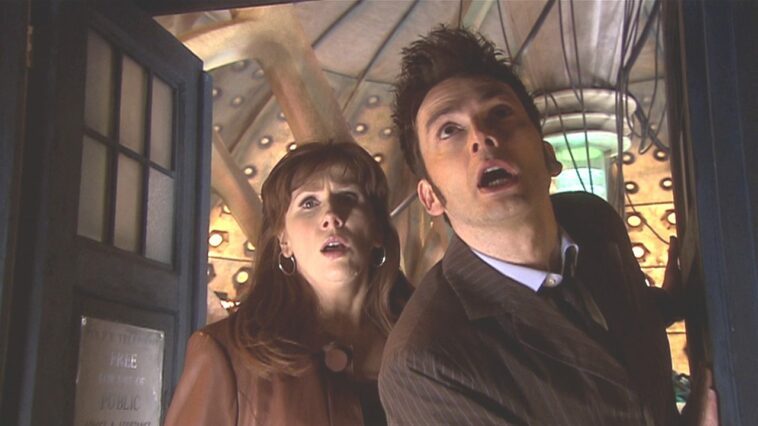It’s no secret that most Doctor Who fans praise David Tennant as their favourite Doctor. Despite the success of Billie Piper and Freema Agyeman as his first two companions, Rose Tyler and Martha Jones respectively, Catherine Tate’s Donna Noble is another firm fan-favourite. So the success of Season 4 was inevitable, really.
Doctor Who never has any major overarching seasonal plots. Each season generally builds towards some kind of universe-dooming finale, but with limited hints sprinkled throughout. Especially in the Russell T Davies era of the show, the focus tends to be on emotional impact and character arcs alongside classic Monster of the Week stories. Season 4 is no different.
The Doctor and Donna: A Match Made in Space
As the glue that holds Season 4 together, the Doctor and Donna are a powerful central duo. The Time Lord-companion dynamic can make or break a season in Doctor Who, and this one is firmly in the former category. Season 4 truly wouldn’t be the same without them.
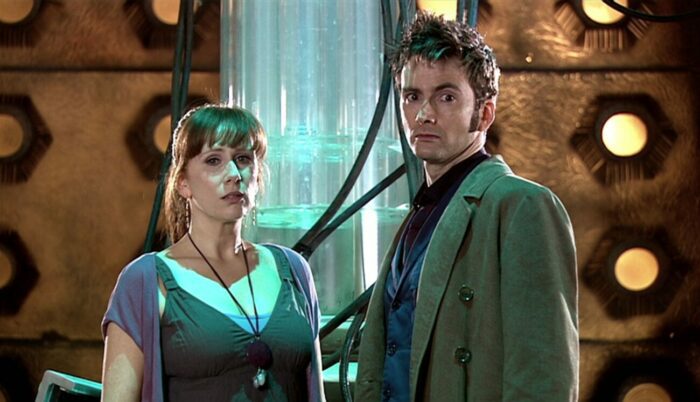
In Seasons 2 and 3, the relationship between the Tenth Doctor and his respective companion leans towards the romantic side as opposed to standard friendship. Fans can’t deny the mutual romantic tension between the Doctor and Rose, culminating in what is essentially a confession of love between them in “Doomsday.” Martha’s feelings for the Doctor in Season 3 aren’t reciprocated, and this is ultimately the reason why she leaves him in “Last of the Time Lords.” Even in the Christmas special “The Voyage of the Damned,” the Doctor has a whirlwind romance with Astrid Peth (Kylie Minogue). Although these dynamics have their own merits, the solely platonic relationship between the Doctor and Donna in Season 4 is a breath of fresh air.
It’s clear that Russell T Davies wanted to steer away from the interference of romantic implications by how direct the friendship angle is from the start of Season 4. When inviting Donna to travel with him, the Doctor states, “I just want a mate.” He communicates his needs in a straightforward manner, and Donna fulfills this for her own gain, too—well, after an amusing misunderstanding that leads to Donna insisting, “You’re not mating with me, sunshine!”
This interaction is just one example of the incredible comedic chemistry between David Tennant and Catherine Tate throughout Season 4. Another instance in the same episode (“Partners in Crime,” S4E1) is when the Doctor and Donna finally see each other again after many near misses, but at the most inconvenient moment. Their eyes lock through windows on either side of the room which they’re both spying on the enemy through, so they can communicate only via ineffectual charades. Considering Catherine Tate has a long-running, successful career as a comedian, it’s no surprise that she’s delightfully funny as Donna. However, she does a great job of drawing it out of David Tennant as well.
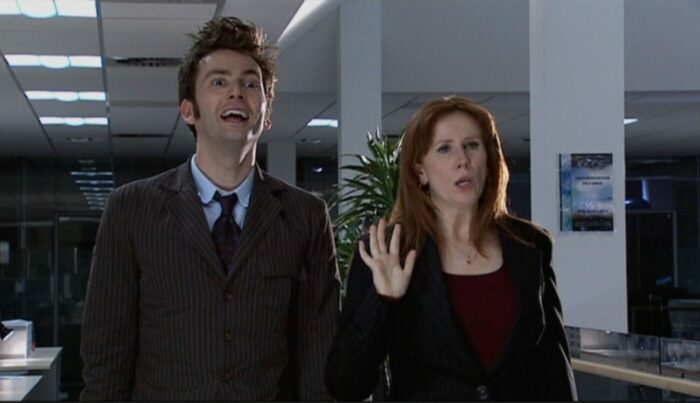
Alongside the comedy, Catherine Tate’s performance is deeply emotional, leading to some poignant moments throughout the season. As we see from Donna’s home life, her mother, Sylvia Noble (Jacqueline King) is rather a toxic figure. She constantly chips away at Donna’s limited self-esteem by interrogating every little thing she does, making her feel small and as though she’s doing nothing valuable with her life. Donna still lives with her mother and grandfather at this age, works as a secretary, and has failed relationships in her past. All these things make her sympathetic and give a voice to the unheard majority of UK citizens. In fact, it’s very reassuring having a woman in her mid-30s as the Doctor’s companion instead of a young woman; it shows that the adventure isn’t over when you get past your 20s, that there’s still so much left to explore and become.
Donna’s response to her low self-confidence is to make sure her voice is heard, sticking to her guns and refusing to back down. But what really makes her so special is that her true strength stems from her kindness and empathy. Instead of continuing the cycle of squashing others like her mother does, she ensures those around her feel loved and safe. Even the Doctor has a lot to learn from Donna; her humanity and pure goodness influence him positively.
At this point in the show, the Doctor is hurting badly from losing Rose and Astrid (and being left by Martha). His reaction to this hurt and loneliness is to become more cynical and less forgiving. The first example of this is when he murders the Racnoss children in “The Runaway Bride” (Donna’s first appearance, which occurred in Season 3), and it continues throughout Season 4. Donna serves as the Doctor’s moral compass. Her endless empathy rubs off on him, as she always encourages him to save people and do what’s right. For example, she demands that the Doctor save Caecilius’s family in “The Fires of Pompeii” (S4E2), defying his insistence on preserving the timeline, and has a huge part in freeing the Ood in “Planet of the Ood” (S4E3).
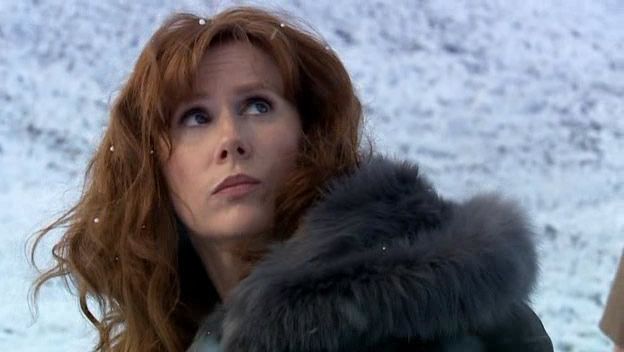
We see the direct consequences of Donna’s influence on the Doctor in “Turn Left” (S4E11). In an alternate reality where she never met the Doctor, he died after murdering the Racnoss children. Other major characters die, and Britain ends up under martial law. This is obviously an extreme version of events, but the principle stands: without Donna, not only would the Doctor not survive, but the world would be a far worse place. She is the real hero of Season 4.
Know Your Enemy
Keeping with the theme of empathy channelled through Donna, a lot of the “monsters” in Season 4 are sympathetic. For example, the Ood are a slave race, and the real monsters are the humans keeping them trapped. Equally, the Hath in “The Doctor’s Daughter” (S4E6) are victims of a war with humans as a result of the humans’ selfishness and refusal to coexist with them in peace. In fact, humans are often the villains of the stories across this season. Despite the Sontarans being the main enemy, Luke Rattigan (Ryan Sampson) allying himself with them in “The Sontaran Stratagem” (S4E4)/”The Poison Sky” (S4E5) exacerbates the danger. “Midnight” (S4E10) demonstrates the worst of humanity by exposing their hostile mob mentality in extreme circumstances.
In these stories, the monsters are merely tools used to highlight the dark side of humans. On the other hand, the nuance of humanity is also explored. Although Luke Rattigan starts off as a villain, he eventually redeems himself with an act of self-sacrifice, destroying the threat of alien invasion. The very best of humanity is also showcased alongside the bad. River Song (Alex Kingston), a time- and-space-traveller who debuts in “Silence in the Library” (S4E8)/”Forest of the Dead” (S4E9), is an extremely intelligent, resourceful, and brave archeologist who ends up sacrificing herself to save others. Jenny (Georgia Tennant), the Doctor’s biological offspring created in “The Doctor’s Daughter,” is a one-episode wonder who is incredibly skillful and kind, and also ends up sacrificing herself for the Doctor, teaching a moral lesson to humans in the process.
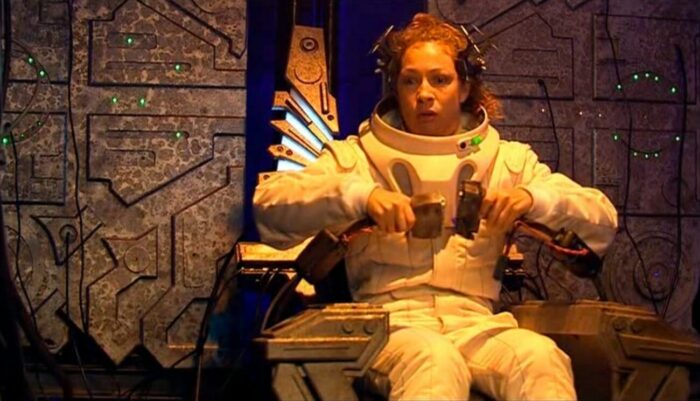
All these characters are heroes in their own right. Their courage and honour in the face of death and destruction is truly admirable and sets an example for both the Doctor and the audience. It reignites his faith in people once again. In addition, their sacrifices foreshadow the end of Season 4, “The Stolen Earth” (S4E12)/”Journey’s End” (S4E13). Many companions return in the fight to save Earth from Davros and the Daleks, including Rose Tyler, Martha Jones, Captain Jack Harkness (John Barrowman), and Sarah Jane Smith (Elisabeth Sladen). Davros (Julian Bleach) makes a jab at the Doctor, claiming his companions are “ordinary people” who he “fashion[s] into weapons.” He continues his accusations:
Already I have seen them sacrifice today, for their beloved Doctor. […] How many more? Just think. How many have died in your name?
Every sacrifice the Doctor’s companions have made for him is used against him, playing off his guilt. At heart, we know the Doctor doesn’t want this and that he never asked anyone to give so much for his cause. However, the moral ambiguity of the Doctor in Season 4 is summed up rather well by Davros’s words, bringing into question the heroic status of the Doctor. Is he really as good as we perceive him to be? It’s no lie that many people have died as a result of their involvement in his life. Obviously this is never intentional on the Doctor’s part, but it brings into question whether he should draw people into his dangerous lifestyle in the first place. Do the people he saves outweigh those he loses? And for him, is it better to have loved and lost than never loved at all?
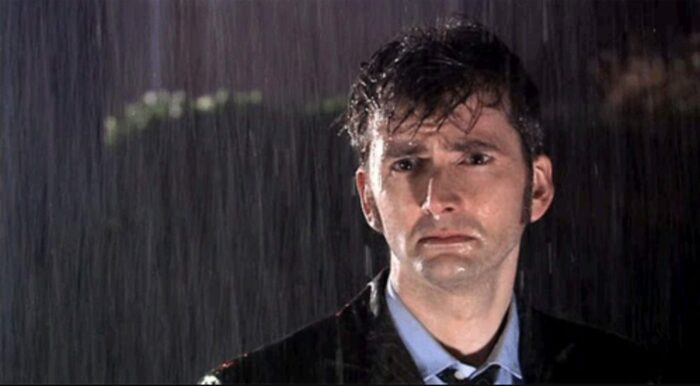
This is a key question for Donna’s inevitable sacrifice at the end of the season, even though it’s not quite as straightforward as previous sacrifices.
A Tear-Jerking Finale
In “Journey’s End,” Donna makes a desperate reach while trapped in the TARDIS, which results in a Doctor-Donna hybrid clone. She then becomes imbued with Time Lord knowledge, using it to diffuse a “Reality Bomb” and save the day. Tragically, Donna doesn’t realise that the knowledge is too powerful to be contained in a human mind, therefore it will kill her unless the Doctor wipes her memory. What follows is one of the most emotionally devastating scenes of the show.
There are many reasons why Donna’s memory wipe is so crushing. Firstly, the Doctor doesn’t really consider any other solutions to save Donna. Even though he realises he must do this to save her life, it’s just horrible. He also doesn’t give Donna a choice. It’s her own mind, at the end of the day, and by making this decision on her behalf, the Doctor is essentially removing her autonomy. To have this done to a character who has been firmly asserting herself and making sure her voice is heard throughout the season, gaining confidence over time, is especially gut-wrenching.
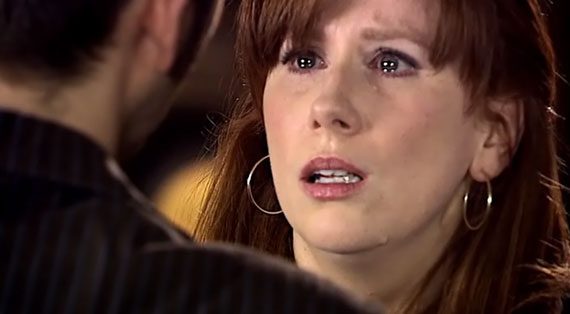
Furthermore, erasing Donna’s memory erases her character development along with it. All the self-esteem and power she found in herself over the course of Season 4 is lost. She returns to a hollowed-out version of herself, stuck in her toxic mother’s house, right back where she started. The adventures she experienced, the bonds she forged, and the courageous and mighty woman she became have all vanished. She’s a shell of a hero.
In regards to the Doctor himself, do his actions show that he’s not really changed at all since the start of Season 4? Not only is Donna’s character development erased, but so is his. The man who started to believe in humanity again, the man who strived for goodness, the man who thought the world was worth saving, has returned to the jaded cynic who loses everyone he loves. Since Donna was his moral compass, losing her means losing the human part of him. This leads to a darker version of the Doctor seen in the Season 4 specials, particularly in “The Waters of Mars.”
To end on a less depressing note, Season 4 of Doctor Who is a beautifully portrayed range of emotions. From light-hearted comedy to soul-crushing sadness, the season doesn’t shy away from the joys or the tragedies of life as we know it or life as we don’t know it—the bizarro space adventures and funky alien species shown throughout. Ultimately, the sci-fi elements of the show serve as a backdrop for humanity’s ever-beating heart. Season 4 isn’t the beginning, and it certainly isn’t the conclusion. The journey keeps on moving, even after its end.

